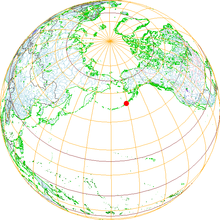Αναφορά στον Ivan Pan'kov, έναν από τους αρχηγούς των Αλεούτων της Αλάσκας, που, ορθόδοξος χριστιανός ο ίδιος, συνεργάστηκε με τους αγίους Ιννοκέντιο Βενιαμίνωφ και Ιάκωβο Νετσβέτωφ (επίσης Αλεούτο, από τη μητέρα του) για τη διάδοση της Ορθοδοξίας στο λαό του, αλλά και για τη δημιουργία αλφαβήτου και βιβλίων στη γλώσσα τους.
Εδώ ένας άλλος ορθόδοξος χριστιανός αρχηγός από τους αυτόχθονες της Αμερικής. Δείτε και την εμπειρία ενός σύγχρονου προτεστάντη ιεραπόστολου (τώρα ορθόδοξου) στη χώρα των Αλεούτων, καθώς και τα links στο τέλος αυτής της ανάρτησης...
 |
| The Aleutian Islands (from here) |
Chief Pan'kov was bilingual and fully literate. (from here)
The Unangan (from here)
Several migrations of various tribes from eastern Asia crossed over the Bering Land Bridge into North America thousands of years ago (Laughlin, 1980, 10, 65, 75–78). One of these migrations included a people who would master the seas and come to dominate the islands that would eventually bear their name along the North Pacific Rim, the Aleutian Islands [Aleut: Unangan tanangin]. The inhabitants of the Aleutian Islands evolved a spoken language known as Unangam tunuu. As the population dispersed from east to west along the Aleutian Island Chain, they developed language dialects. Those Aleut people living among the eastern Aleutians, Umnak eastward (Bergsland, 1994, xvi), referred to themselves as Unangan (people of the seashore) and those living in the western Aleutians, Atka to Attu (Bergsland, 1994, xvi and 47), refer to themselves as Unangas. The singular form of the word “people” in Unangam Tunuu is Unangax.
 The Unangan and Unangas did not have a written language until the arrival of the Russians in the eighteenth century, and more specifically, due to the efforts of members of the Russian Orthodox Church led by Reverend Ivan (Ioann)Veniaminov. Veniaminov created an Aleut orthography using a modified Cyrillic alphabet. According to noted Aleut linguist Knut Bergsland, Veniaminov created “the first tentative grammar and vocabulary of Eastern Aleut.” (Bergsland, 1994, viii)
The Unangan and Unangas did not have a written language until the arrival of the Russians in the eighteenth century, and more specifically, due to the efforts of members of the Russian Orthodox Church led by Reverend Ivan (Ioann)Veniaminov. Veniaminov created an Aleut orthography using a modified Cyrillic alphabet. According to noted Aleut linguist Knut Bergsland, Veniaminov created “the first tentative grammar and vocabulary of Eastern Aleut.” (Bergsland, 1994, viii)Then two Aleuts, Ivan Pan’kov, a chief of Tigalda, and Father Iakov Netsvetov worked with Veniaminov to translate several religious works into Aleut. A written Unangam Tunuu continued to evolve with the work of other Orthodox priests such as Innokenti Shayashnikov and Lavrentiy Salamatov (Bergsland, 1994, viii). The immediate and intimate participation by Aleuts themselves, and the willingness of Russian Orthodoxy to include Unangam Tunuu in the liturgy, are given significant credit for the rapid and devoted adoption of the faith by the Unangas and Unangan.
Click:
Lydia T. Black, Ivan Pan'kov: An Architect of Aleut Literacy
Δεν υπάρχουν σχόλια:
Δημοσίευση σχολίου